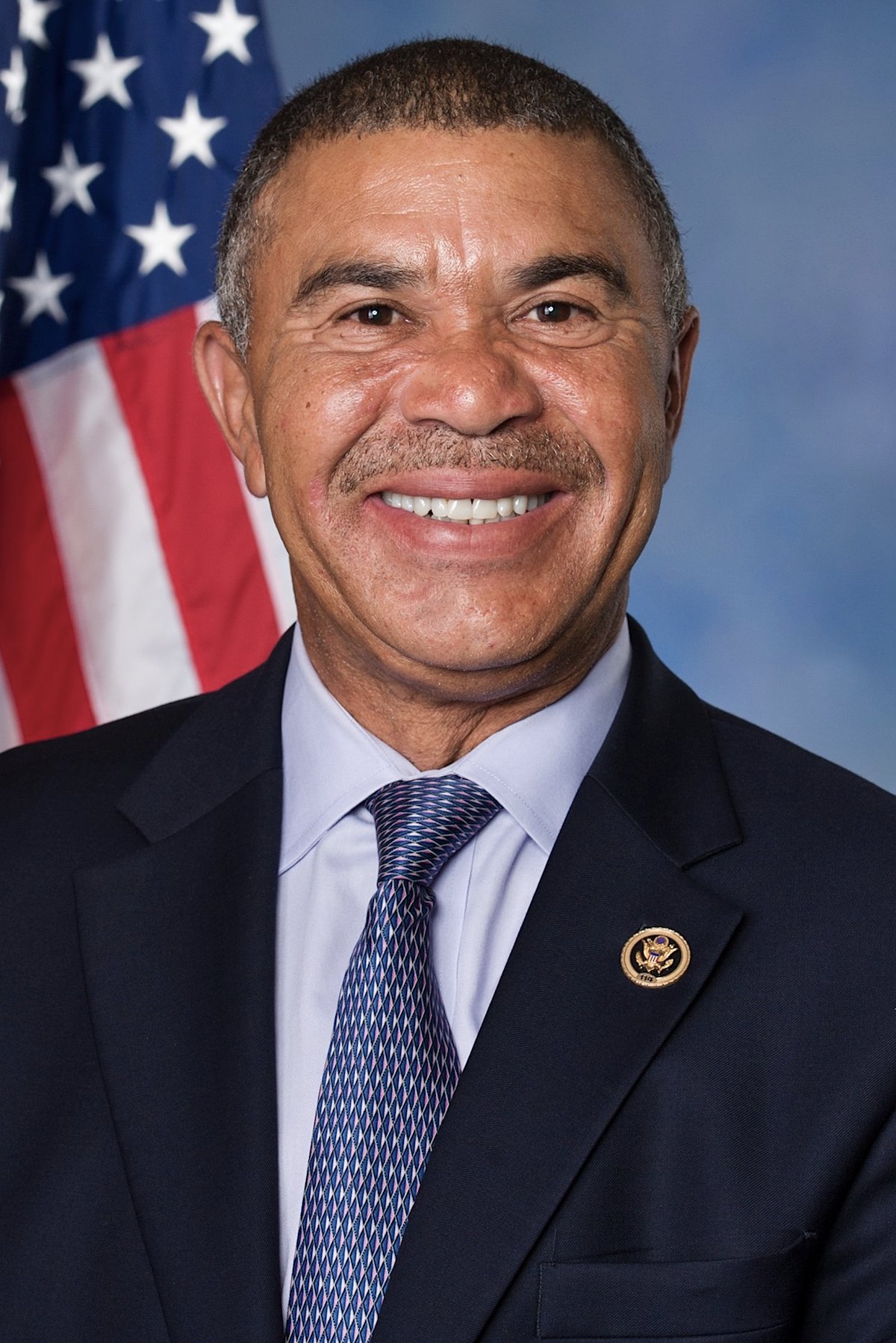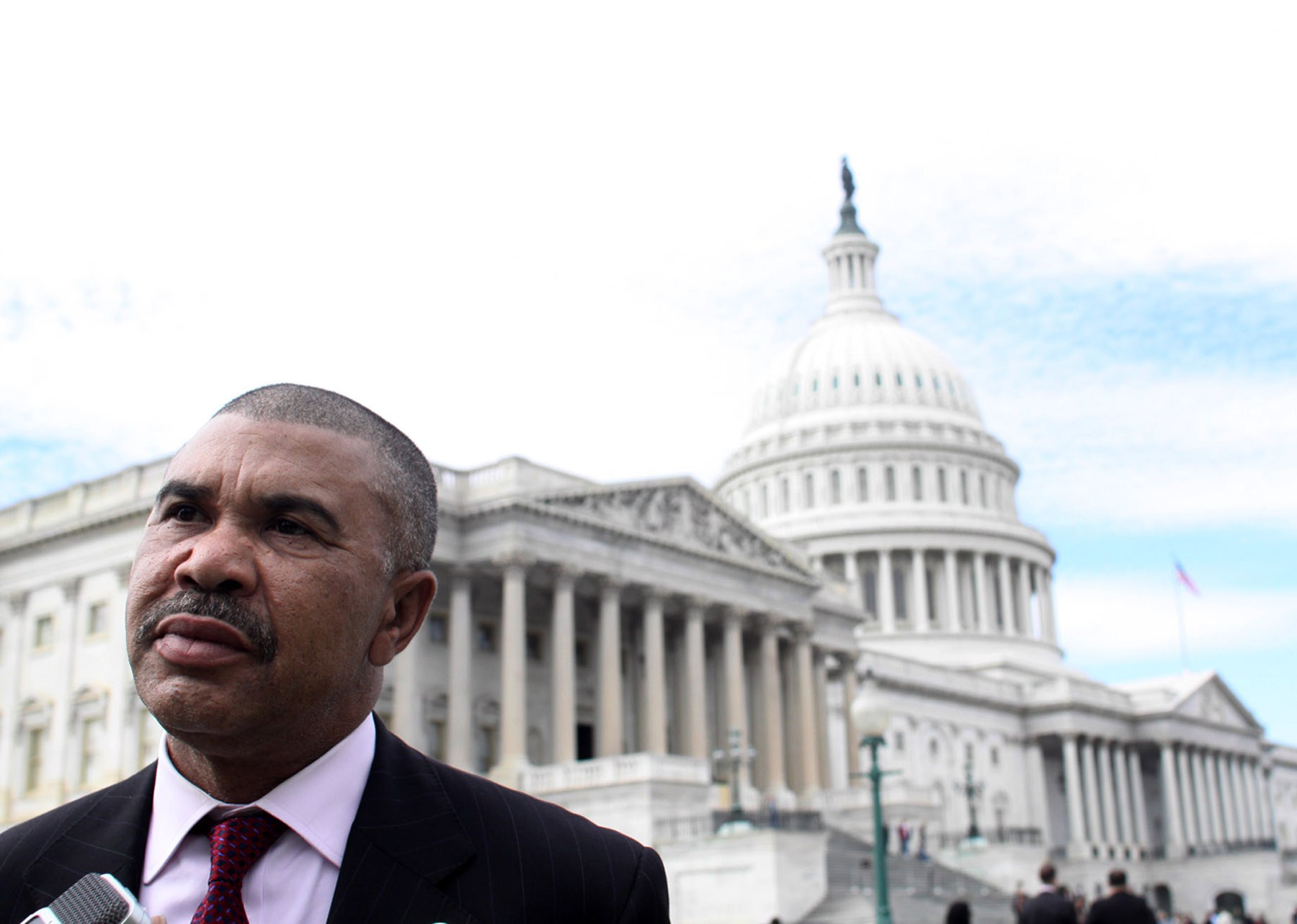Lacy Clay
Office
United States Representative, Missouri, 1st District
Biography
Congressman Wm. Lacy Clay was first elected to the U. S. House of Representatives in 2000, succeeding his father, the Honorable Bill Clay, who served for 32 years and was a founding Member of the Congressional Black Caucus. He is currently serving his 9th term. Prior to his election to the U.S. House, Mr. Clay served for 17-years in both chambers of the Missouri Legislature.
Congressman Clay champions our 1st Amendment freedoms and he remains a staunch advocate for the arts and creative freedom. Recently, Mr. Clay led the fight to oppose the suppression of free speech principles constituted by the removal of his 18-year old constituent David Pulphus' award-winning painting from the Congressional Art Competition exhibit on Capitol Hill. Congressman Clay continues to advocate on behalf of First Amendment principles and to resist artistic censorship based upon political viewpoints.
The Congressman is a senior member of the powerful House Financial Services Committee where he serves as the Ranking Member on the Subcommittee on Financial Institutions and Consumer Credit. This key subcommittee has major oversight responsibilities over banks, credit unions, brokerage houses, the Securities and Exchange Commission, the Consumer Financial Protection Bureau and credit rating agencies.
His consumer-friendly legislative record on the Financial Services Committee includes the introduction of the Small Bank Exam Cycle Reform Act of 2015; a bill that would increase from $500 million to $1 billion the asset size of small insured depository institutions eligible for 18-month on-site examination cycles.
The Congressman also introduced the Preserving Capital Access and Mortgage Liquidity Act of 2015, a bill that would amend the Federal Home Land Bank Act to redefine “community financial institution” to include either a federal or state chartered credit union.
And as part of his response to the reckless investment practices which led to the financial collapse of 2008-2009 and the Great Recession, Congressman Clay cosponsored the Community Bank Clarification Act to amend the Financial Stability Act of 2010 with respect to minimum leverage capital requirements and minimum risk-based capital requirements for depository institution holding companies including mandatory deductions from actual capital in the calculation of minimum capital requirements for certain investments by such institutions, especially in financial subsidiaries; and the exemption of such capital deductions for the debt of equity instruments issued by certain smaller institutions.
Mr. Clay is also a senior member on the Oversight and Government Reform Committee, which has major oversight and investigative responsibilities for the operations of the federal government.
He was able to advance two of his bills in the 114th and 115th Congresses.
Congressman Clay introduced HR 2908 - The National Bison Legacy Act in the 114th Congress. This act designated the North American bison as the national mammal of the United States. The legislation, which attracted strong bipartisan support, was crafted to honor both this magnificent animal and the sacred and spiritual legacy of Native Americans. After attracting support from a coalition of over 60 agencies, including Native American tribes, ranchers, and government agencies; this bill was unanimously passed in both the House and Senate and was signed into law by former President Barack Obama on May 9, 2016.
Congressman Clay also introduced HR 70 - The Federal Advisory Committee Act Amendments (FACA) in the 115th Congress. This bill closes the loopholes that allow agencies to get around the original Act. Currently, agencies can avoid the requirements of FACA by conducting committee business through subcommittees. This bill makes it clear that FACA applies to subcommittees as well as parent committees. Also under this act, agencies would be required to disclose how advisory members are chosen, whether they have financial conflicts of interest if they are appointed to provide their own expertise, and who they work for if they are representing a specific interest. This bipartisan bill unanimously passed the House on January 4, 2017.
In 2014, Congressman Clay expanded his congressional portfolio to include a seat on the House Natural Resources Committee where he is working to combat climate change, protect wilderness areas, safeguard clean water and clean air and make sure that future generations enjoy America’s remarkable natural assets.
His legislative agenda on the Natural Resources Committee includes the introduction of HR 3683 - The African American Civil Rights Network Act. His bill directs the Secretary of the Interior to identify and create a national network of historic sites, stories, research facilities and educational programs connected to the modern African American Civil Rights Movement.
The historic civil rights trails and the programs that will grow from this act will honestly tell the full and sometimes painful story of the struggle for civil rights, not just for African Americans, but to foster healing, tolerance and understanding among all Americans. HR 3683 garnered 76 bipartisan cosponsors, including several Natural Resources Committee Members. HR 3683 also had a bipartisan Senate companion bill, S 2309.
The Congressman is the St. Louis region’s senior Member of Congress and the Dean of Missouri’s U.S. House delegation.
Wm. Lacy Clay is a native St. Louisan.
He is a graduate of the University of Maryland.
Mr. Clay also holds honorary degrees from Lincoln University, Harris- Stowe State University, the University of the District of Columbia and Logan College.
Congressman Clay is the proud father of Carol and Will.
He resides in St. Louis and attends St. Nicholas’ Catholic Church.
Source: Lacy Clay.House.Gov

...

...
Social
More Representatives
Lacy Clay

...
Office
United States Representative, Missouri, 1st District
Biography
Congressman Wm. Lacy Clay was first elected to the U. S. House of Representatives in 2000, succeeding his father, the Honorable Bill Clay, who served for 32 years and was a founding Member of the Congressional Black Caucus. He is currently serving his 9th term. Prior to his election to the U.S. House, Mr. Clay served for 17-years in both chambers of the Missouri Legislature.
Congressman Clay champions our 1st Amendment freedoms and he remains a staunch advocate for the arts and creative freedom. Recently, Mr. Clay led the fight to oppose the suppression of free speech principles constituted by the removal of his 18-year old constituent David Pulphus' award-winning painting from the Congressional Art Competition exhibit on Capitol Hill. Congressman Clay continues to advocate on behalf of First Amendment principles and to resist artistic censorship based upon political viewpoints.
The Congressman is a senior member of the powerful House Financial Services Committee where he serves as the Ranking Member on the Subcommittee on Financial Institutions and Consumer Credit. This key subcommittee has major oversight responsibilities over banks, credit unions, brokerage houses, the Securities and Exchange Commission, the Consumer Financial Protection Bureau and credit rating agencies.
His consumer-friendly legislative record on the Financial Services Committee includes the introduction of the Small Bank Exam Cycle Reform Act of 2015; a bill that would increase from $500 million to $1 billion the asset size of small insured depository institutions eligible for 18-month on-site examination cycles.
The Congressman also introduced the Preserving Capital Access and Mortgage Liquidity Act of 2015, a bill that would amend the Federal Home Land Bank Act to redefine “community financial institution” to include either a federal or state chartered credit union.
And as part of his response to the reckless investment practices which led to the financial collapse of 2008-2009 and the Great Recession, Congressman Clay cosponsored the Community Bank Clarification Act to amend the Financial Stability Act of 2010 with respect to minimum leverage capital requirements and minimum risk-based capital requirements for depository institution holding companies including mandatory deductions from actual capital in the calculation of minimum capital requirements for certain investments by such institutions, especially in financial subsidiaries; and the exemption of such capital deductions for the debt of equity instruments issued by certain smaller institutions.
Mr. Clay is also a senior member on the Oversight and Government Reform Committee, which has major oversight and investigative responsibilities for the operations of the federal government.
He was able to advance two of his bills in the 114th and 115th Congresses.
Congressman Clay introduced HR 2908 - The National Bison Legacy Act in the 114th Congress. This act designated the North American bison as the national mammal of the United States. The legislation, which attracted strong bipartisan support, was crafted to honor both this magnificent animal and the sacred and spiritual legacy of Native Americans. After attracting support from a coalition of over 60 agencies, including Native American tribes, ranchers, and government agencies; this bill was unanimously passed in both the House and Senate and was signed into law by former President Barack Obama on May 9, 2016.
Congressman Clay also introduced HR 70 - The Federal Advisory Committee Act Amendments (FACA) in the 115th Congress. This bill closes the loopholes that allow agencies to get around the original Act. Currently, agencies can avoid the requirements of FACA by conducting committee business through subcommittees. This bill makes it clear that FACA applies to subcommittees as well as parent committees. Also under this act, agencies would be required to disclose how advisory members are chosen, whether they have financial conflicts of interest if they are appointed to provide their own expertise, and who they work for if they are representing a specific interest. This bipartisan bill unanimously passed the House on January 4, 2017.
In 2014, Congressman Clay expanded his congressional portfolio to include a seat on the House Natural Resources Committee where he is working to combat climate change, protect wilderness areas, safeguard clean water and clean air and make sure that future generations enjoy America’s remarkable natural assets.
His legislative agenda on the Natural Resources Committee includes the introduction of HR 3683 - The African American Civil Rights Network Act. His bill directs the Secretary of the Interior to identify and create a national network of historic sites, stories, research facilities and educational programs connected to the modern African American Civil Rights Movement.
The historic civil rights trails and the programs that will grow from this act will honestly tell the full and sometimes painful story of the struggle for civil rights, not just for African Americans, but to foster healing, tolerance and understanding among all Americans. HR 3683 garnered 76 bipartisan cosponsors, including several Natural Resources Committee Members. HR 3683 also had a bipartisan Senate companion bill, S 2309.
The Congressman is the St. Louis region’s senior Member of Congress and the Dean of Missouri’s U.S. House delegation.
Wm. Lacy Clay is a native St. Louisan.
He is a graduate of the University of Maryland.
Mr. Clay also holds honorary degrees from Lincoln University, Harris- Stowe State University, the University of the District of Columbia and Logan College.
Congressman Clay is the proud father of Carol and Will.
He resides in St. Louis and attends St. Nicholas’ Catholic Church.
Source: Lacy Clay.House.Gov
Social
More Representatives
...
